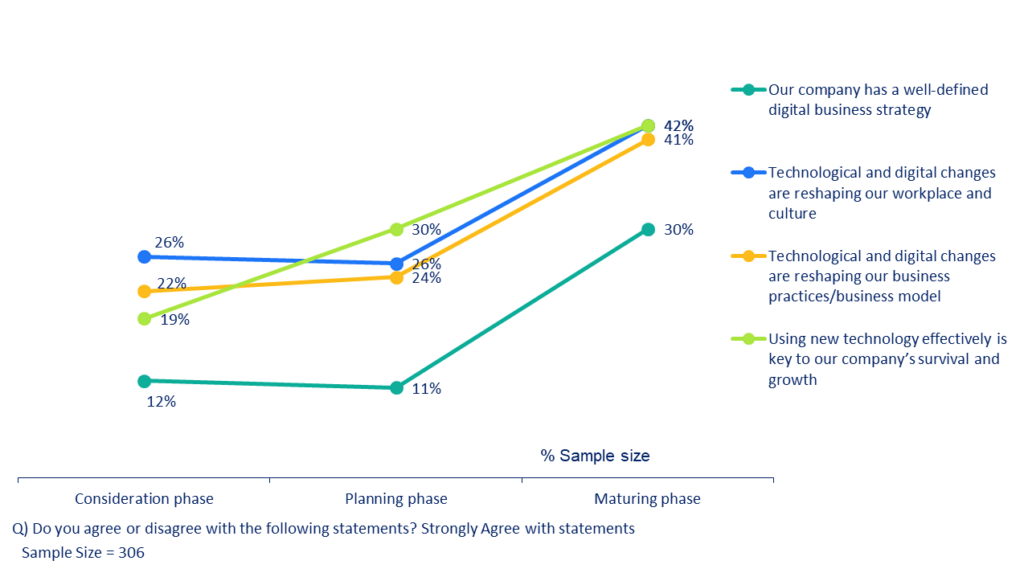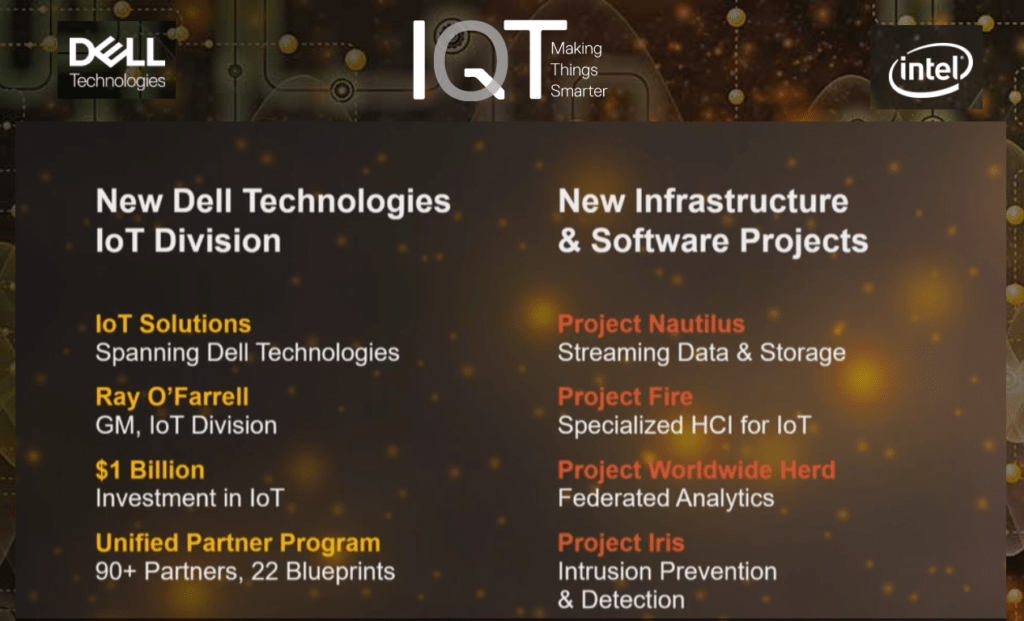Author: Sanjeev Aggarwal, SMB Group
 How many of you have visited a farm recently? I had the opportunity to visit one as part of Dell Technologies IQT Day held in New York City on October 11, 2017. AeroFarms is far from a conventional farm. There are no rolling fields, no tractors tilling soil or farmers in their soiled clothes.
How many of you have visited a farm recently? I had the opportunity to visit one as part of Dell Technologies IQT Day held in New York City on October 11, 2017. AeroFarms is far from a conventional farm. There are no rolling fields, no tractors tilling soil or farmers in their soiled clothes.
AeroFarms, operates inside a Newark, NJ warehouse that formerly served as a lumberyard for a steel company. Now, AeroFarms uses the nearly 70 thousand square feet of floor space in that warehouse as a vertical farm, illustrating a significant change that is underway in the food industry, enabled by aeroponics and Smart Internet of Things (IoT) technologies.
And it’s not just happening in the food industry. Medium-sized businesses (100-1,000 employee-size companies) interest in and readiness to take action to use digital technologies to transform their businesses is growing across the board, as evidenced in SMB Group’s 2017 SMB Digital Transformation Study, October 2017 (Figure 1). Over 41% of medium businesses strongly agree that:
- Technological and digital changes are reshaping the workplace and culture.
- Using new technology effectively is key to company’s survival and growth.
- Technological and digital changes are reshaping business practices/business model.
In addition, 30% say they have a well-defined strategy for digital transformation.
Figure 1: Medium Business Technology Attitudes (how companies in the three phases strongly agree with statements on the right legend)
 Source: 2017 SMB Digital Transformation Survey, October 2017, SMB Group, © SMB Group
Source: 2017 SMB Digital Transformation Survey, October 2017, SMB Group, © SMB Group
AeroFarms’ digital transformation
AeroFarms moved to Newark, NJ from Ithaca, N.Y., in 2015 to be closer to the consumption centers. AeroFarms not only disrupted traditional agriculture, they used technology to significantly refine the vertical farming techniques to achieve very compelling results.
This modern vertical farm grows leafy greens indoors and aeroponically — by misting the roots with a cocktail of water, nutrients and oxygen — under LED lights.
The main crop at AeroFarms is baby salad greens. These greens command a premium price, and can grow from seed to harvest in less than two weeks. This enables AeroFarms to harvest the greens 30 times a year; to optimize taste, texture, color and nutritional value, and to price the salad leaves at the same price against traditionally grown produce.
These methods help AeroFarms farms to produce 395 times more output than with a conventional field farm of a similar size. Other upsides include that AeroFarms:
- Uses no chemical pesticides.
- Requires 95% less water and fertilizer than traditional farms.
- Reduces food waste by as much as 60%.
- Produce is fresher, has more flavor and a 20 to 30 percent longer shelf life than the same crop grown outside.
Aeroponics plays an essential and very visible role in helping AeroFarms innovate and achieve these impressive results. Behind the scenes, Dell Technologies IoT solutions are just as critical to enabling AeroFarms to reach its goals.
Dell Technologies IoT enables AeroFarms to innovate
AeroFarms has embedded sensor technology along their symmetric, multi-layered rows of plants. These sensors, which are connected to Dell Edge gateways, gather thousands of different data-points, monitoring the environment, temperature, humidity, nutrients, lighting, color of leaves and other data points. Optical sensors help monitor the plant growth rate, and shape, size and color of the leaves.
Dell EMC converged systems, the “Distributed Core” computing model track these data points and more in real-time. Artificial Intelligence (AI) and machine learning technology work in concert with Dell EMC’s IoT infrastructure to deliver smarter, more predictive IoT solutions, and enable AeroFarms to make automated adjustments to these variables to optimize crop yield.
Dell Technologies IoT Focus
This is just one example of Dell Technologies focus and investment in IoT. At Dell Technologies IQT Day, the vendor announced a new IoT Division designed to coordinate and speed up the development of products and services across Dell Technologies companies. To support this, the company will invest $1B in IoT R&D over next three years.
Figure 2: New Dell Technologies investments and projects
 Source: Dell Technologies, 2017
Source: Dell Technologies, 2017
New IoT product development and service initiatives include:
- Dell EMC ‘Project Nautilus’: Software that enables the ingestion and querying of data streams from IoT gateways in real-time. Data can subsequently be archived to file or object storage for deeper advanced analytics.
- ‘Project Fire’: A hyper-converged platform that is part of the VMware Pulse family of IoT solutions, and that includes simplified management, local compute, storage and IoT applications such as real-time analytics. ‘Project Fire’ enables businesses to roll out IoT use cases faster and have consistent infrastructure software from edge to core to cloud.
- RSA ‘Project IRIS’: Currently under development in RSA Labs, Iris extends the Security Analytics capability to provide threat visibility and monitoring to the edge.
- Disruptive technologies, such as processor accelerators, will increase the velocity of analytics closer to the edge.
- Project ‘Worldwide Herd’: For performing analytics on geographically dispersed data, which is key to enable deep learning on datasets that cannot be moved for reasons of size, privacy and regulatory concerns.
- IoT Vision Workshop: Identifies and prioritizes high-value business use cases for IoT data, essentially how and where to deploy IoT analytics to improve business.
- IoT Technology Advisory: Consulting services to help customers develop the overall IoT architecture and implementation roadmap.
Dell Technologies is also expanding its IoT partner program and solutions ecosystem.
Summary and perspectives
Is AeroFarms a farm or a technology company? Maybe the answer is that as a farm that is deploying a disruptive digital transformation strategy and business model, it is both. AeroFarm’s story underscores that fact that digital transformation solutions are increasingly relevant for companies of all shapes and sizes.
This story also illustrates that in addition to providing corporate advantages, digital transformation can also provide environmental benefits. For instance, safe drinking water is scarce: nearly 1 billion people in the developing world don’t have access to it. With 69% of the world’s freshwater consumption committed to agriculture, companies like AeroFarms can put technology to work to help conserve water.
AeroFarm’s story also highlights some important pointers that other SMBs can learn from when developing a digital transformation strategy, including:
- Have a well-defined digital business strategy driven by a key stake holder with participation from a cross-functional team.
- Understand how technology and digital changes are reshaping the workplace and culture.
- Review technology and digital changes that are reshaping business practices/business models.
In an increasingly complex and competitive world, businesses will increasingly encounter more and more varied competition from both traditional and new companies that are focused on disrupting the status quo. In this environment, almost all companies will need to figure out how to use technology to differentiate, create sustainable business advantage and grow.
